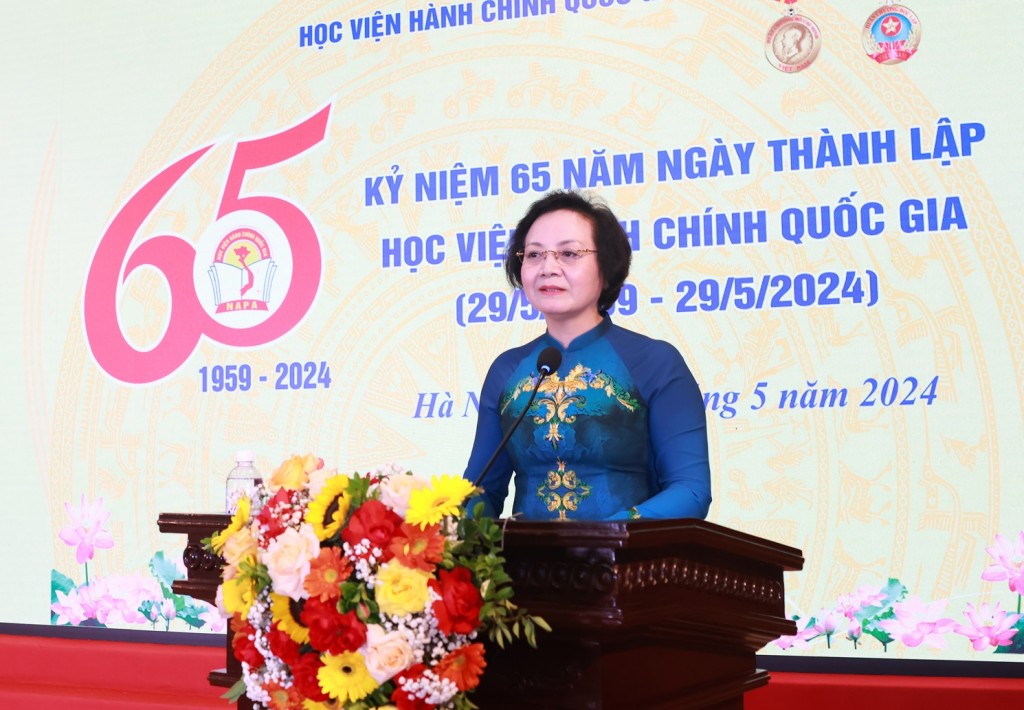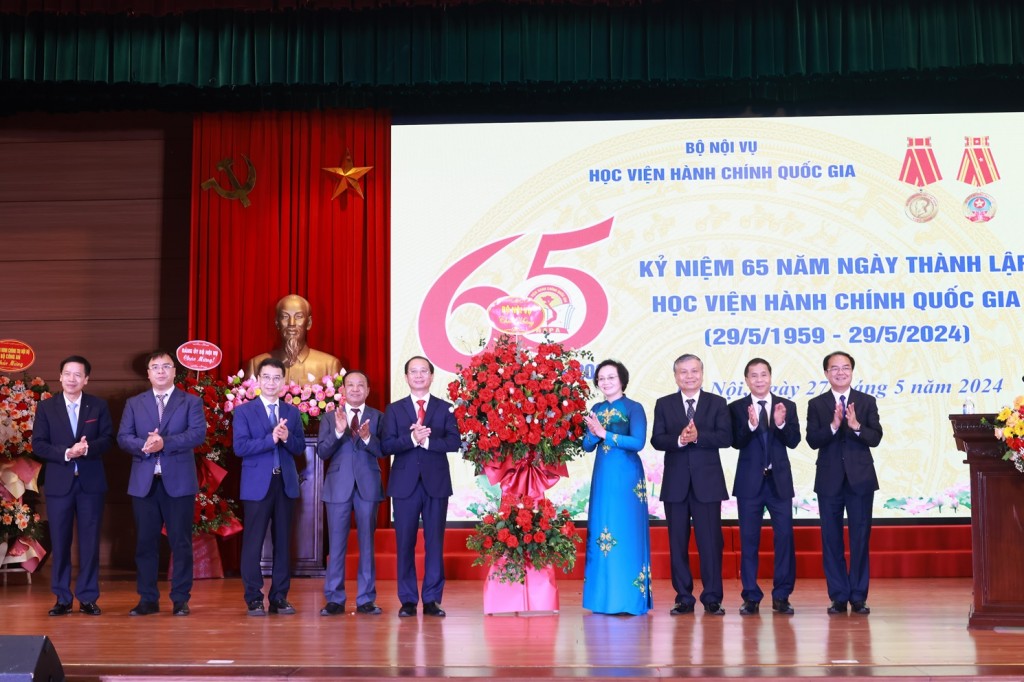Dear leaders of ministries, departments, branches, localities, and representatives of embassies, and distinguished guests!
Dear esteemed leaders of the Ministry of Home Affairs and the National Academy of Public Administration (NAPA) across the various generations, delegates, and distinguished guests!
Dear NAPA lecturers, officials, students and trainees!
Today, MoHA Vice Ministers and I are filled with joy to attend the 65th Anniversary of the founding of NAPA. On behalf of the Party Committee and Leaders of the Ministry of Home Affairs, I extend my heartfelt greetings and best wishes to the generations of lecturers, officials, students of NAPA, delegates, and distinguished guests.
Ladies and gentlemen!
65 years ago, on May 29, 1959, the Government promulgated Decree No. 214-NV, laying the foundation for the School of Administration under the Ministry of Home Affairs, the precursor to our esteemed NAPA. Since then, NAPA has been at the forefront of training district-level officials, playing a significant role in constructing a revolutionary government and achieving resistance and national construction goals. This is not merely a milestone in public service training and career development in our country, but a testament to our unwavering dedication to the nation’s progress. Through numerous stages, under various names, and amidst organizational and legal changes, NAPA has continued to evolve and mature, making a substantial contribution to the cause of national liberation and reunification as well as in the work of building and safeguarding the Fatherland.
As we look back on the 65-year journey of construction and development, we can take pride in the remarkable achievements and glorious traditions of NAPA. What was once a humble training facility in the village communal house in Phu Luu, Tu Son district, Bac Ninh province, has now blossomed into a comprehensive system spanning Ha Noi Capital, the Central region, the Central Highlands, and Ho Chi Minh City. The NAPA’s team, consisting of lecturers, researchers and officials, has grown both in numbers and in quality. It is the collective effort of generations of leaders, lecturers, researchers, and officials that have driven NAPA to develop in all aspects, particularly in human resource training for society, cadre development, and research in administrative science and public governance.
Over the past 65 years, NAPA has trained over 500 thousand middle and senior management leaders, officials, and civil servants for the political system, and nearly one hundred thousand bachelor, master, and PhD students in public management, public policy, and state management. Numerous officials, civil servants, and public employees trained by NAPA have matured and assumed high positions in the Party and State strategic leadership agencies, are cadres of ministries, branches, and localities, and are key managers at the central and local levels.
In the realm of scientific research and consulting, NAPA has demonstrated unwavering scientific responsibility towards the country’s practical issues. Since the 90s, NAPA’s researchers have been at the forefront of administration and administrative reform research. The works of the late Professor Doan Trong Tuyen, the late Professor Mai Huu Khue, and many other renowned professors and researchers of NAPA have been of significance, contributing to the Party, State, Government, and Ministry of Home Affairs in formulating policies, strategies, and policies on organization and operations of state administration.
In international cooperation, NAPA has been active in integrating and establishing relationships with reputable training and scientific research establishments in many countries and international organizations. It has helped NAPA broaden its mindset and vision, continuously innovate governance skills, programs, and training methods, thus enhancing the quality, efficiency, position and reputation of NAPA socially, regionally and globally.
Through 65 years of construction and development, NAPA has always affirmed its position as a special-class public service unit, a national center for training, scientific research, and international cooperation. With significant contributions and exceptionally outstanding achievements over time, NAPA and its many individuals have been recognized by the Party and State with many noble honors such as the Ho Chi Minh Order, Independence Medal, Labor Medal, and many orders, medals, prizes, and noble titles. On behalf of the Party Committee and Ministry of Home Affairs leaders, I warmly praise NAPA’s achievements in the 65 years of development.
On this occasion, on behalf of the Party’s Civil Affairs Committee of the Ministry, Party Committee, and Leaders of the Ministry of Home Affairs, I express my deep gratitude to generations of NAPA leaders, officials, lecturers, civil servants, and staff who have diligently cultivated and built a glorious and proud tradition of our NAPA!
Ladies and gentlemen, distinguished guests!
Dear NAPA lecturer and officials!
Although there are still difficulties, limitations, and challenges ahead, NAPA has numerous advantages and opportunities to firmly embark on a new phase of development. NAPA should become more aware of its mission and responsibilities. With its bolstered legal status and augmented resources, NAPA is primed for a new era of breakthrough developments and exceptional accomplishments. NAPA bears a significant role and responsibility in the task of training a contingent of public officials. Upholding the tradition of 65 years of construction and growth, NAPA must concentrate on executing the following tasks with utmost diligence:
Firstly, NAPA determines a strategic vision and a focus for development, with the clear aspiration to become a prestigious center for training leaders and managers globally. This vision is built on the principles of taking quality and operational efficiency as the foundation, with learners at the center, and NAPA’s autonomy as the driving force for development. The goal is to enhance the role of innovation and creativity and to instill a strong desire for growth in every member of NAPA, including cadres, officials, and lecturers. The ultimate objective is to establish NAPA as a prestigious center for training leaders and managers regionally and globally, offering comprehensive training and knowledge transfer programs. It is essential to revamp the approach to training and nurture and cultivate NAPA’s cultural, knowledge, and scientific value system to build a distinguished and reputable brand both domestically and internationally. NAPA should strive to become an attractive destination for domestic, regional, and international civil servants, public employees, and students to receive training, nurturing, and academic exchange and to seek valuable knowledge in the foreseeable future.
Secondly, it is necessary to continue to grasp the spirit of the Central and Politburo Resolutions deeply and State documents on innovation and improving the quality of education and training. This is for the fundamental and comprehensive innovation of training at NAPA, modernizing and transforming training methods and technologies. To begin with, there needs to be a shift in the philosophy of training cadres, civil servants, and public employees, moving from equipping knowledge to developing capacity, training according to job position, training elites, and fostering talents. Next is to innovate methods, technology, content, programs, textbooks and training materials. The intensive training program for cadres, civil servants, and public employees associated with public service reality must be a national governance knowledge guide for cadres, civil servants, and public employees. The current public service requires increasingly higher competence, quality, and responsibility for civil servants and public employees, so NAPA must be a bridge to overcome and narrow the gap between the competence of officials and public servants and the increasingly demanding public service practices in this period.
Thirdly, NAPA’s commitment to innovation should be at the forefront of becoming a key higher education institution in public management and public policy, following innovative university models with the motto of in-depth science and innovation. Innovation is a core value in producing quality human resources. To achieve this goal, NAPA must have a specific roadmap for developing each element that creates its value, building a brand and identity of NAPA that genuinely stands out among hundreds of higher education and training institutions today.
Fourthly, it is essential to underscore the importance of investing in research tasks. The challenges posed by globalization, national development, and administrative reform are significant and demand answers. NAPA’s role is to concentrate on elucidating practical issues, swiftly resolving development problems and bottlenecks, and providing robust and persuasive scientific arguments for the policy formulation process. These are the very issues that shape the State’s policies and laws, making them the primary concerns of the State administration and serving state management of the Home Affairs sector. I am optimistic and eagerly anticipate that, in the near future, NAPA lecturers and researchers will produce numerous research products with fresh perspectives, valuable policy advice, and highly predictive properties. This will undoubtedly enhance the stature and creativity of NAPA.
At the same time, it is necessary to promote international cooperation activities that not only attract resources for developing and training lecturers but also open up opportunities to affirm NAPA’s capacity, exchange knowledge, and enrich management knowledge for humanity.
Fifthly, a significant objective is to elevate the quality of NAPA’s teaching staff. They should be deeply rooted in Ho Chi Minh’s thoughts and teachings. As Ho Chi Minh rightly pointed out, those involved in training cadres “must be a model in all aspects: ideology, ethics, working style” and “have to study further to be able to perform their training job.” This is to ensure that NAPA’s lecturers are truly intelligent and exemplary individuals. Alongside nurturing our current lecturers, NAPA must attract a greater number of experts and reputable managers in public policy, public administration, and related fields. Their involvement in training will significantly contribute to NAPA’s aspiration to be a leading institution in attracting talents, cultivating humanity, perfecting personality and developing human resources.
Sixthly, NAPA needs to have a specific roadmap to develop the Digital Academy concept to modernize the training, eradicating the limitations of space and time in training and creating favorable conditions for officials, civil servants, public employees, students, and trainees to access knowledge, training, and anytime, anywhere, domestically as well as internationally.
Dear students and trainees!
It is a great honor to study at NAPA, which has a 65-year tradition of excellence. Every student should make the most of their time here to study, exchange ideas, engage in discussions, foster initiative and self-awareness, and use their training to grow personally. Learning should be accompanied by practical application, integrating theoretical and applied knowledge into real-world activities, and effectively managing work situations. The goal is to become intellectually and ethically outstanding officials, civil servants, and public employees with a sense of public service responsibility, contributing to developing a professional, responsible, dynamic, and talented public service.
To all the students in their prime, I encourage you to dedicate these months and years to studying, practicing, conducting research, preparing for the future, and always living up to the standards of being a student at NAPA. Be filled with aspirations and passion, live with ideals, establish yourselves, and embark on your careers.
Ladies and gentlemen, distinguished guests!
Dear NAPA lecturers, staff, students and trainees!
With a glorious tradition that has been built and nurtured over the past 65 years, driven by political determination and supported by the Government, the Prime Minister, and the Ministry of Home Affairs, and with a large team of professional scientists and lecturers, I am confident that NAPA will successfully fulfill all assigned tasks. This will allow it to make an even more significant contribution to the cause of building and protecting the Fatherland, proving itself worthy of the trust placed in it by the Party, State, and People.
Once again, on behalf of the Party Committee and the leaders of the Ministry of Home Affairs, we wish NAPA continued, rapid, and sustainable development and improvement of prestige and reputation in the region and internationally. We also extend our best wishes to all delegates, lecturers, students, officials, and staff of NAPA for good health, happiness, and success!
Thank you very much!






